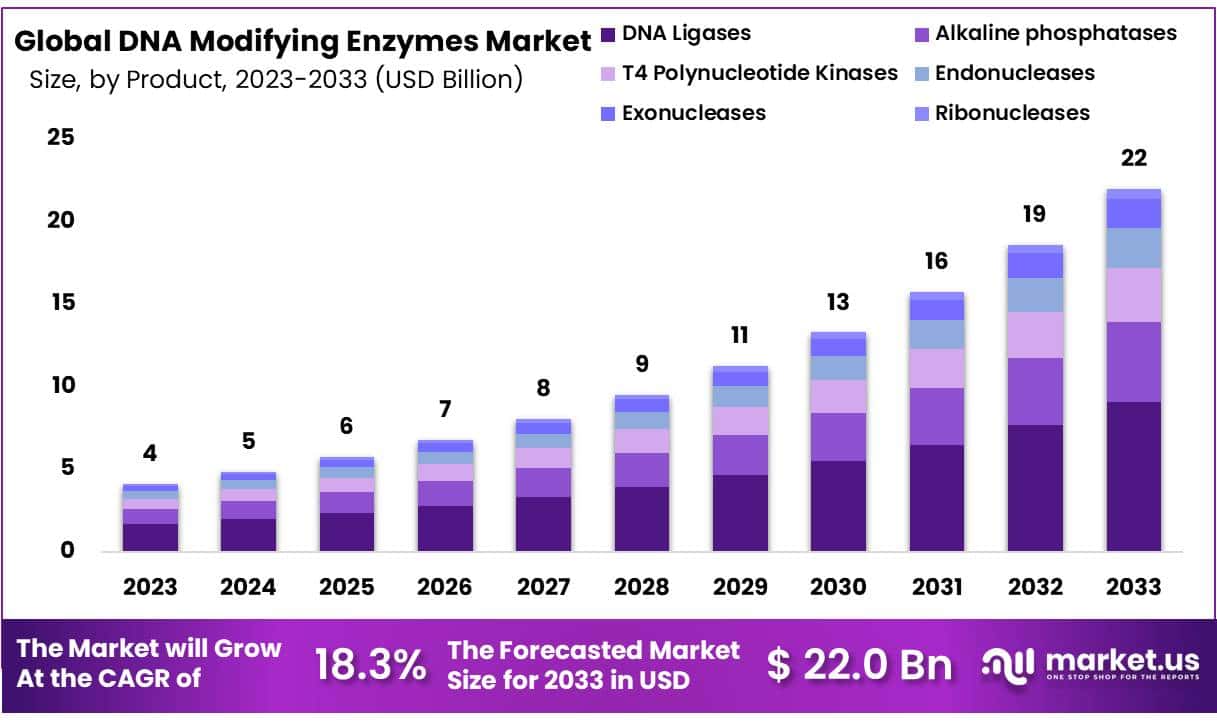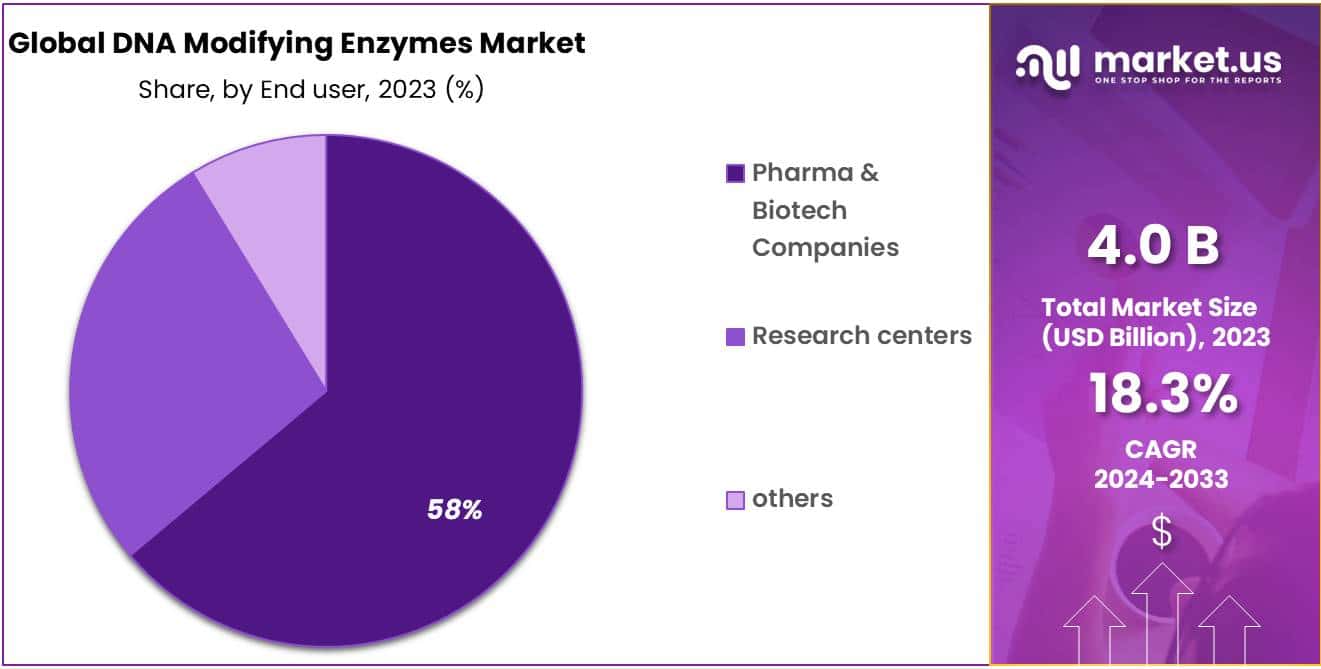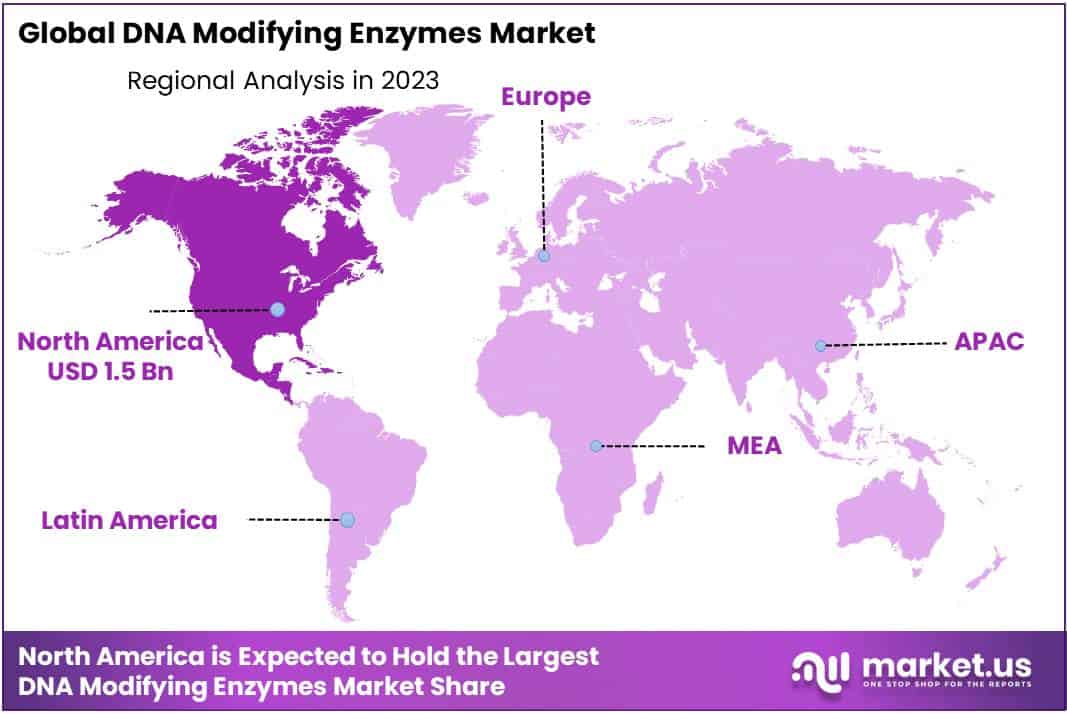Global DNA Modifying Enzymes Market By Product (DNA Ligases, Alkaline phosphatases, Exonucleases, Endonucleases, T4 Polynucleotide kinases, Ribonucleases), by Application (Pharmaceutical and Biotechnology research, Animal feed, Diagnostic, Food and beverages, Biofuel industry), by End user (Pharmaceutical and Biotechnology companies, Research centers), by Region and Companies - Industry Segment Outlook, Market Assessment, Competition Scenario, Trends, and Forecast 2024-2033
- Published date: March 2024
- Report ID: 74616
- Number of Pages: 245
- Format:
-
keyboard_arrow_up
Quick Navigation
Report Overview
The Global DNA Modifying Enzymes Market size is expected to be worth around USD 22.0 Billion by 2033 from USD 4.0 Billion in 2023, growing at a CAGR of 18.3% during the forecast period from 2024 to 2033.
DNA modifying enzymes are a group of specialized proteins that play an essential role in the maintenance and expression of genetic information. Catalyzing chemical reactions and modifying structure of DNA such as replication, repair, recombination and transcription is done by these enzymes. The growth in DNA modifying enzymes market is due to rising demand for high quality healthcare treatments, highly effective pharmaceuticals and other treatment based solutions. Top-notch remedies and other medical procedures are discovered by the pharmaceutical companies.

The rise in the requirement of healthcare services is directly proportional to the growing population worldwide. Along with this, many businesses are developing the manufacturing and distribution strategies in order to generate more revenue and survive in the market climate.
Long waited clinical trials, expensive treatment costs, and stringent regulatory processes are various roadblocks in the expansion of DNA modifying enzymes market. But the pharmaceutical industries still manage to maintain the up surging revenue of DNA modifying enzymes market by lowering product manufacturing errors and increasing manufacturing procedure efficiency.
Key Takeaways
- Market Size: DNA Modifying Enzymes Market size is expected to be worth around USD 22.0 Billion by 2033 from USD 4.0 Billion in 2023.
- Market Growth: The market growing at a CAGR of 18.3% during the forecast period from 2024 to 2033.
- Product Analysis: DNA ligase dominates the product segment in 2023, holding a large share of 41.2% in DNA modifying enzymes market.
- Application Analysis: Pharmaceutical and biotechnology research holding a large market share of 59.3% in 2023, dominating the application segment.
- End-Use Analysis: Pharma and biotech companies dominates the market, thus holding a large market share of 58.4%.
- Regional Analysis: North America hold the largest market share of 38.2%, dominating the regional segment.
By Product Analysis
DNA Ligase dominates the segment by 41.2%
Based on product type, the DNA modifying enzyme market have been segmented into DNA Ligases, Alkaline phosphatases, Exonucleases, Endonucleases, T4 Polynucleotide kinases, and Ribonucleases. DNA ligase is responsible for three common purpose: sealing recombination fragment, connecting Okazaki fragments formed during replication of double stranded DNA, sealing repairs in DNA. It has a major role in the process of DNA repair and DNA replication. The properties of food such as digestibility, nutritional content, shelf life, taste and texture can be modified by dint of DNA ligases.
Development of R&D in order to form DNA ligases as therapeutic interferences for cancer is expected to drive the market of DNA modifying enzymes. In addition to this, increase in prevalence of infectious disease, birth rate and genetic disorders are responsible for the popularity of DNA ligases. Due to these factors, DNA ligase dominates the product segment in 2023, holding a large share of 41.2% in DNA modifying enzymes market.
By Application Analysis
Pharma and Biotech research incorporates more usage of DNA modifying enzymes
Categorized by the applications, the DNA modifying enzymes market is divided into pharmaceutical and biotechnology research, animal feed, diagnostic, food and beverages, biofuel industry, etc.
DNA modifying enzymes are a group of specialized proteins that play an essential role in the maintenance and expression of genetic information. The use of DNA modifying enzymes is significant for pharmaceutical and biotechnology research, thus holding a large market share of 59.3% in 2023, dominating the application segment. In the 1980s, scientists began using biotechnology research in order to introduce genetically modified crops. These genetically modified crops make use of DNA modifying enzymes such as endonucleases and ligases for restricting and ligating the genes in order to develop the required genes with desired qualities.
Among the countries making use of DNA modifying enzymes for biotech and pharma research purposes are USA, Brazil, Argentina and India. The recombinant DNA technology make use of DNA modifying enzymes to manufacture various pharmaceutical products such as vaccines and pharmaceuticals. These recombinant pharmaceuticals are now being used confidently and rapidly attaining commercial approvals. Techniques of recombinant DNA technology, gene therapy, and genetic modifications are also widely used for the purpose of bioremediation and treating serious diseases. Thus, all these factors contribute to foster the market of DNA modifying enzymes.
By End User Analysis
Pharma and Biotech companies fuel the DNA modifying enzymes market
Categorized by their application, the market is segmented into pharmaceutical and biotechnology companies, Research centres.
Increasing consumer demand, population and awareness about disorders and their consequences are poised to increase the utilization of DNA modifying enzymes in pharmaceutical and biotechnology companies. The growing R&D had made it possible for these enzymes to be used in drug formulation and delivery. Cloning and expressing the DNA modifying enzymes in suitable microbial hosts is majorly done by the research sectors.
Validation of technologies and formulation of innovative modifying enzymes for commercial processing as well as human wellbeing is focused by R&D of several companies. These broad research activities incorporated in pharma and biotech companies dominates the market, thus holding a large market share of 58.4%.

Key Market Segments
By Product
- DNA Ligases
- Alkaline phosphatases
- Exonucleases
- Endonucleases
- T4 Polynucleotide kinases
By Application
- Pharmaceutical and biotechnology research
- Animal feed
- Diagnostic
- Food and beverages
- Biofuel industry
By End user
- Pharmaceutical and Biotechnology companies
- Research centers
Market Drivers
Development of pharma and biotech products drives the market
Use of DNA ligases and restriction endonucleases for restricting and ligating purposes played an important role in genetic engineering. The common uses such as synthesis, degradation, and modification of nucleic acid by DNA modifying enzymes turned the history of genetic modification, giving rise to a significant number of biotechnology and pharmaceutical products.
The market of DNA modifying enzymes is specifically fueled due to development in pharma and biotech companies such as introduction of modified protein and genetic engineering. Genetic engineering involves adding a gene from one species to an organism from a different species to produce a desired trait using DNA modifying enzymes. The successful examples of genetic modification by virtue of DNA modifying enzymes are transgenic pigs and sheep, western corn rootworm, sunions (tearless onion), carrots that help prevent osteoporosis. Thus, these advancements in biotech and pharma products fosters the market of DNA modifying enzymes.
Market Restraints
Adherence to regulatory guidelines
Various factors such as adherence to regulatory guidelines by different governing agencies are hampering the growth of DNA modifying enzymes market.
For example, enzyme preparations should conform to the purity specifications for enzyme preparations provided in the monograph “Enzyme Preparations” of the 6th (2008) or current edition of the Food Chemicals Codex (FCC).
Moreover, the lack of standardization in regulatory structure for industrial use of DNA modifying enzymes hinders the growth of this market.
Opportunities
Industries to excel with numerous applications in genetic engineering
Genetic engineering, also known as genetic modification, makes use of biotechnology in order to manipulate the genome of an organism. It includes alteration in genetic makeup of cell, including transfer of genes within and across species boundaries for the production of novel organisms. The alteration in genetic makeup of the organism is only possible with the use of DNA modifying enzymes.
In medicine, genetic engineering can be applied to manufacturing of drugs, gene therapy, production of vaccines, human growth hormones, monoclonal antibodies, etc. In research, genetic engineering helps to insert wide range of genetic information from an organism into the bacteria, creating genetically modified bacteria. In industries, the cells can be transformed into an organism in order to get a useful protein. In addition to this, genetic engineering can be applied to conservation, natural area management and microbial art.
As there are numerous applications of genetic engineering, so the use of DNA modifying enzymes also increases, thus creating various opportunities for the industries to grow and the market to excel.
Latest Trends
There are various new modifications incorporated in DNA modifying enzymes market.
Gibson Assembly: Is a robust exonuclease based method to assemble DNA seamlessly and in correct pair. Under isothermal conditions the reaction is carried out using three enzymatic activities: a 5’ exonuclease generates long overhangs, a polymerase fills in the gaps of annealed ss region, and a DNA ligase seals the nicks of the annealed and filled in gaps, making use of DNA ligase and exonuclease. A 16.3 kb mouse mitochondrial genome from 600 overlapping 60 mers is formed. In addition to this, Gibson assembly can also be used for cloning.
Personalized and Precision medicines: The systematic understanding of genetic variations and their role in diseases, led to the evolution of personalized medicines and targeted therapies approaches. The modification of genetic material is precisely done by DNA modifying enzymes, allowing for the development of personalized treatments and diagnostics for treating diseases, for example, cystic fibrosis.
LEAPER: A recently created gene editing technique ‘Leveraging endogenous ADAR for programmable editing of RNA’ by scientists of Peking University, has a great potential in treating disease. Similar to CRISPR-CAS 13, it has the ability to edit RNA rather than DNA. Researchers from Peking University believe that this technology has more advantage than that of CRISPR.
Impact of macroeconomic factors
COVID-19 Fundamentally affected the economy of DNA Modifying Enzymes Market.
COVID 19 significantly impacted global economic market due to disruption in supply chain, restriction for migration, reduction in inpatient visit in hospitals and clinics to prevent the exposure of coronavirus infection.
The sustainability of this market is majorly accredited to the extensively increasing demand in molecular biology, bio-fuels, bio-detergents, and paper manufacturing processes. With respect to pandemic, many enzyme manufacturing companies, has started hand sanitizer production to fight against coronavirus.
For instance, in April 2020, the major enzyme manufacturer, BASF, had started hand sanitizer production in New York and New Jersey. This might cause a significant decrease in global DNA modifying enzymes market.
Regional Analysis
North America Holds the Largest DNA Modifying Enzymes Market Share
North America has increasing government initiatives and well established biopharmaceutical companies. In addition to this, the technological advancement and standardized industrial infrastructure makes this region to hold the largest market share of 38.2%, dominating the regional segment.
There is a rising prevalence of genetic diseases and a focus for developing the precision medicines in APAC region, making it the fastest growing region in DNA modifying enzyme market. Europe is also witnessing steady growth due to advancements in genetic research and increased funding for biotechnology.

Key Regions and Countries
North America
- US
- Canada
Europe
- Germany
- France
- The UK
- Spain
- Italy
- Russia
- Netherland
- Rest of Europe
Asia Pacific
- China
- Japan
- South Korea
- India
- New Zealand
- Singapore
- Thailand
- Vietnam
- Rest of APAC
Latin America
- Brazil
- Mexico
- Rest of Latin America
Middle East & Africa
- South Africa
- Saudi Arabia
- UAE
- Rest of MEA
Market Player Analysis
There are several key players operating in the DNA modifying enzymes market. BioCat GmbH, New England Biolabs, Takara Bio, Thermo Fisher Scientific, Jena Bioscience GmbH, Lucigen Corporation, ABclonal, Biocompare, Promega Corporation, and NZYTech are some of the prominent companies in this market.
These companies contribute to the growth of DNA modifying enzymes market by innovating and providing high quality products. Sales revenue figures for some of these companies (as of 2020) include New England Biolabs ($400 million) and Thermo Fisher Scientific ($600 billion).
Key Market Players
- BioCat GmbH
- New England Biolabs
- Takara Bio Inc.
- Thermo Fisher Scientific Inc.
- Jena Bioscience GmbH
- Lucigen Corporation
- ABclonal Inc.
- Biocompare
- Promega Corporation
- NZY Tech
- Other market players
Recent Developments
- In November 2023: New England Bio labs launched NEBNext UltaExpress DNA and RNA library kits for the purpose of next generation sequencing on the Illumina platform. With the aid of DNA modifying enzymes, the kit is able to generate high quality libraries with a faster, easier workflow, enabling RNA library preparation in one day, and DNA library preparation within 2 hours.
- In October 2020: CRISPR gene editing platform was first utilized by a Swiss-American company, CRISPR therapeutics AG, to treatment various common and rare diseases such as type 1 diabetes, cancer, cardiovascular diseases, etc.
Report Scope
Report Features Description Market Value (2023) USD 4.1 Billion Forecast Revenue (2033) USD 22.0 Billion CAGR (2024-2033) 18.3% Base Year for Estimation 2023 Historic Period 2018-2022 Forecast Period 2024-2033 Report Coverage Revenue Forecast, Market Dynamics, Competitive Landscape, Recent Developments Segments Covered By Product (DNA Ligases, Alkaline phosphatases, Exonucleases, Endonucleases, T4 Polynucleotide kinases, ribonucleases), by Application (Pharmaceutical and Biotechnology research, Animal feed, Diagnostic, Food and beverages, Biofuel industry), by End User (Pharmaceutical and biotechnology companies, Research centers) Regional Analysis North America-US, Canada, Mexico;Europe-Germany, UK, France, Italy, Russia, Spain, Rest of Europe;APAC-China, Japan, South Korea, India, Rest of Asia-Pacific;South America-Brazil, Argentina, Rest of South America;MEA-GCC, South Africa, Israel, Rest of MEA Competitive Landscape BioCat GmbH, New England Biolabs, Takara Bio, Thermo Fisher Scientific, Jena Bioscience GmbH, Lucigen Corporation, AB clonal, Biocompare, Promega Corporation, NYZTech, other market players. Customization Scope Customization for segments, region/country-level will be provided. Moreover, additional customization can be done based on the requirements. Purchase Options We have three licenses to opt for: Single User License, Multi-User License (Up to 5 Users), Corporate Use License (Unlimited User and Printable PDF) Frequently Asked Questions (FAQ)
What are DNA modifying enzymes?DNA modifying enzymes are proteins that catalyze specific biochemical reactions to alter the structure or sequence of DNA molecules. They play crucial roles in various biological processes, including DNA replication, repair, and transcription.
How big is the DNA Modifying Enzymes Market?The global DNA Modifying Enzymes Market size was estimated at USD 4.0 Billion in 2023 and is expected to reach USD 22.0 Billion in 2033.
What is the DNA Modifying Enzymes Market growth?The global DNA Modifying Enzymes Market is expected to grow at a compound annual growth rate of 18.3%. From 2024 To 2033
Who are the key companies/players in the DNA Modifying Enzymes Market?Some of the key players in the DNA Modifying Enzymes Markets are BioCat GmbH, New England Biolabs, Takara Bio, Thermo Fisher Scientific, Jena Bioscience GmbH, Lucigen Corporation, AB clonal, Biocompare, Promega Corporation, NYZTech, other market players.
What are the major factors driving the growth of the DNA modifying enzymes market?The increasing demand for personalized medicine, advancements in gene therapy and genome editing technologies, and rising investments in biotechnology research and development are among the primary drivers fueling the growth of the DNA modifying enzymes market.
What are the key challenges faced by the DNA modifying enzymes market?Challenges in ensuring the specificity, efficiency, and safety of gene editing technologies, ethical concerns surrounding genome editing in humans, and regulatory uncertainties are some of the key challenges faced by the DNA modifying enzymes market. Additionally, the high cost of enzyme production and limited availability of skilled professionals may also impede market growth.
 DNA Modifying Enzymes MarketPublished date: March 2024add_shopping_cartBuy Now get_appDownload Sample
DNA Modifying Enzymes MarketPublished date: March 2024add_shopping_cartBuy Now get_appDownload Sample -
-
- BioCat GmbH
- New England Biolabs
- Takara Bio Inc.
- Thermo Fisher Scientific Inc.
- Jena Bioscience GmbH
- Lucigen Corporation
- ABclonal Inc.
- Biocompare
- Promega Corporation
- NZY Tech
- Other market players










